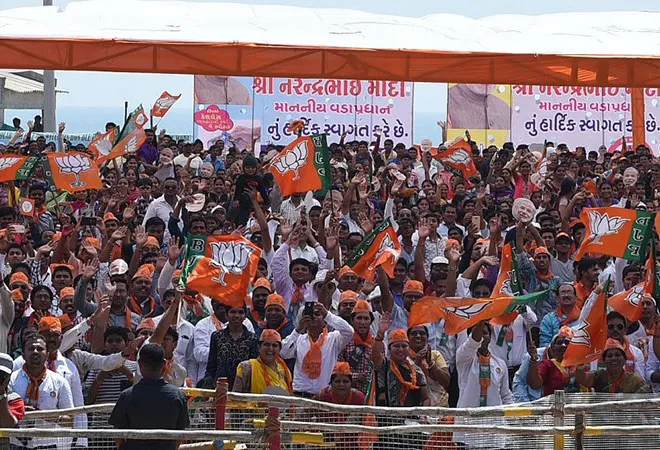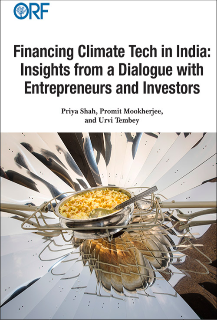Scaling up is the name of the game in politics and in business. The BJP secured enviable gains in the early 2017 municipal elections in Maharashtra and Odisha. A win in the Goa state election is likely. A possible, albeit messy, near-win in Uttar Pradesh and potential inroads into Karnataka, Tamil Nadu and West Bengal portend that the Narendra Modi juggernaut is rolling out a massive, vertically integrated consolidation of party votes across the three levels of government.
In business, too, big is beautiful. Government banks and oil companies are being merged into competitively-sized entities. Reliance, India’s second biggest company by market capitalisation, after Tata Consultancy Services, still rankles at the loss of the top position due to faltering gas production. It is now hitting back at the fragmented competition in telecom, targeting an aggressive 50 per cent share by 2021.
The government sector too is expected to grow. Some of this is dictated by the compulsions of the faltering international economy. Private capital is risk averse when returns are dodgy. Public capital then is the only option. India is terribly under-capitalised in network and social infrastructure. We spend less than one half of what we should to get rid of the infrastructure constraints on growth and security. The government’s budget needs to expand by at least one-fourth to accommodate the necessary capital spend. FY 2017-18 is not budgeted to be different from the past. There is not enough time before the 2019 general election for grounding project plans into reality. Jobs will consequently be funded by public finance.
Should citizens and consumers then be apprehensive about the drive to consolidate and grow across government and business? Not really. Dominance is a systemic outcome of competition. Institutional safeguards can ensure that dominance is not misused to dilute citizen and consumer interests. The scale of operations should be a matter of choice, not compulsion, or the outcome of regulatory nudges. Citizens should rather be concerned that decent jobs won’t come unless businesses and government grow to scales dictated by market parameters.
The overriding, concern for notional equity is typical of a nanny State. We only pay lip service to equity. Equity has worsened under the low-level equilibrium of extensive citizen rights; indifferent governance and low efficiency capital allocation and utilisation. Just six per cent of commercial entities and two per cent of the commercial workforce is in the formal sector. Perverse incentives drive business fragmentation.
The political architecture is similarly fragmented. A loose law allows a mind-boggling 1,452 political parties to be “registered” by the Election Commission under the Representation of the People Act 1951. Only 54 parties are recognised at the state level and just six are national parties. Recognition has stricter norms linked to voter share and elected candidates. Believe it or not, the commission’s powers to de-register moribund parties are not explicit.
Multi-party politics has become a fetish, far beyond its usefulness to the average voter. Tightening up on representational norms is possible without diluting the basic freedom to choose one’s political party. Just gearing up the disclosure, internal governance and accounting requirements, to the levels required for companies, can reduce the number of registered parties.
Enforcing regulatory compliance can deter frivolous registration and ensure responsible representation. This is illustrated by the experience of companies. Of the 16 million commercial entities operating in India, just one million are registered under the Companies Act 2013, despite the benefits which accrue from registration. It is not as if only large commercial entities choose to get registered. 66 per cent of companies are very small with an authorised share capital below Rs 1 million or just $15,000. But the widespread reluctance to register is because of the accompanying higher levels of disclosure required. Political parties would respond similarly. Only the most serious ones would remain registered if regulatory requirements were increased in the public interest.
Why should we think of political consolidation as a public good? Our fractured and divisive social architecture provides ready opportunities for exploitation of the cleavages for narrow political purposes. We must make it difficult for parties. which cater solely to narrow agendas. Social inclusion fundamentalists would rebel against any institutional constraint on the freedom of a political party to represent even marginal views. But look at the trade-offs. Caste and religion find no place, in our Constitution, as legitimate grounds for political mobilisation. Introducing institutional mechanisms which encourage broad-banding of political platforms is therefore legitimate.
One way to ensure such broad-banding across castes and religions is to mandate that parties must replicate the prevailing rainbow of castes and religions while nominating candidates in specific jurisdictions. Savvy political parties are already doing so. The BJP broadened its appeal to dalit and backward caste voters in Uttar Pradesh (2017). A quarter of Bahujan Samaj Party candidates are Muslims to demonstrate Mayawati’s good faith while seeking Muslim support. The Samajwadi Party’s tieup with the Congress broadens its appeal to dalits and upper castes — both long-time supporters of the Congress.
In a fragmented political market, institutional compulsions to broaden the electoral base can be an effective catalyst for consolidation. This would be a welcome change from the minimalist strategy of securing the largest number of votes polled by splintering your opponent’s voteshare below your own.
Limiting governmental and private sector dominance by constraining their ability to grow has negative social and economic outcomes. We barred Facebook from giving free access to a limited Internet space in 2016 due to the misplaced fear of deep pockets-driven future dominance. E-commerce — similarly driven by deep pockets — has somehow bucked the tendency to protect incumbents. Institutional reform to regulate big institutions is overdue. Smart laws and empowered regulators can sift destructive dominance from scaling up for efficiency enhancement. Bulking up is the international trend. We cannot but conform.
This commentary originally appeared in The Asian Age.
The views expressed above belong to the author(s). ORF research and analyses now available on Telegram! Click here to access our curated content — blogs, longforms and interviews.




 PREV
PREV


